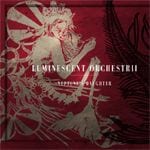
Is it cute? I’ve come across a few albums from US bands that do the Balkan thing and somehow manage to cutesy it up — not hugely, just enough to make it sound false in a subtle way: poor-person music performed by the well-fed, or sad-person music performed by the happy. The music has been firmed out and shaped up, refitted, neatened, and sweetened, and something has been lost, something almost evanescent, something that I barely noticed in the first place, but, now that it’s gone, I wonder where it went. It’s that elusive thing of tone. The transfer between cultures has introduced (What? A Broadway touch?) a character change? Yes, it’s as if the music, by switching countries, has also changed its personality. Perhaps it comes down to expectations that the audiences in each place have of the people who perform for them. A fiddler from Eastern Europe will sound aggressive, for example, where an American fiddler tackling the same music will sound excited and friendly. One expects to be paid because you respect him. The other expects to be paid because you think he’s a nice guy. It’s a different kind of showmanship: the one shoots off surprises at you like a fake snake in a peanut can, the other slides you into the surprises by degrees so that you’re not too shocked, and the nice-guyism remains intact.
Perhaps it’s got nothing to do with the performers at all, and comes down purely to the way the albums have been put together in their respective regions? A small mystery.
Anyway, having said all of that, what about the Luminescent Orchestrii? Neptune’s Daughter leaps at you with a blaze of energy but it’s soon evident that the musicians are nice at heart, rather than truly fierce. You can hear this quality in “How to Play Romanian”, for example, about two minutes in, when the fiddle carefully swoops and swans and sweetens you into the viola. Tunes from Romania and Moldavia have been smartened up, the jagged parts polished off to make them move more neatly, and with more of a sensual, jazzy roll. The musicians are all excellent, eager, full of speed and accuracy. Singing in “Mur Stojmeno”, the two women of the group even make a convincing pair of Voix Bulgare-ish Bulgarians.
The idea of introducing a Balkan-Cuban sound in “La Tarde” would have been an interesting one if only the two styles could have been made to complement one another. The violins slide around in a European way, softening the Latin-American snap so much that it loses its edge and drifts into an indeterminate slush. “Militsa” is another track that makes less of an impact than it ought to. The tune, borrowed from the Pontians, an anciently-established outpost of Greeks on the southeastern Turkish shores of the Black Sea, has a quick, whirling power. It must be dynamite when they play it live. On the album, however, it’s so busy that it loses its shape and smashes around the place like the Hulk. Sitting in the middle of other songs that have been arranged to enhance their clarity, “Militsa” is a puzzle.
Neptune’s Daughter sounds like the album of a band that puts on a lot of good live shows. The energy is audience-directed, rather than seeming to be directed at, say, the performers’ interiors, or a mixing desk, or an ethereal ideal of perfection drifting somewhere in the middle distance. They want to grab you and swing you around a bit, wake you up, give you a good time. If I don’t like them as much as I might, it’s only because I like my Balkans with a little more of a vicious nip, a little less friendliness and soul.
